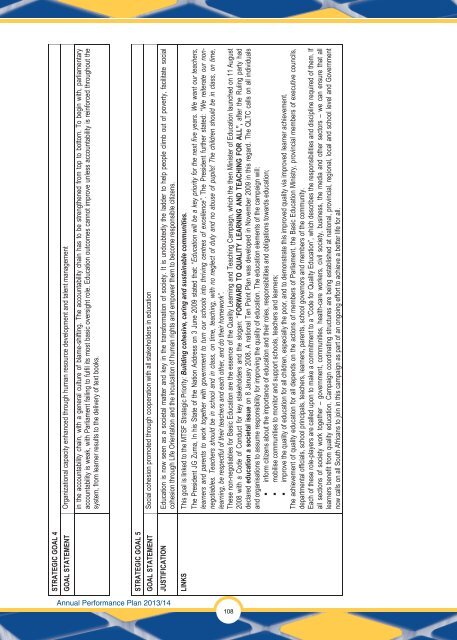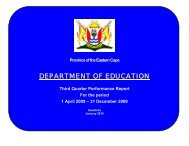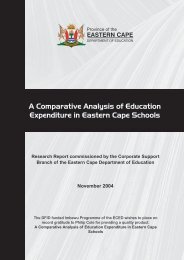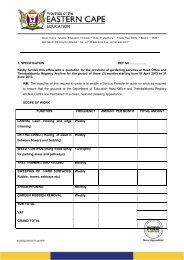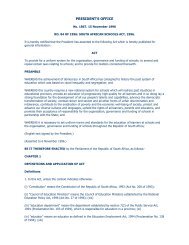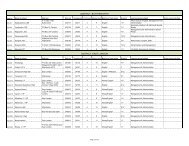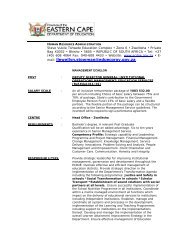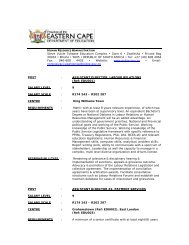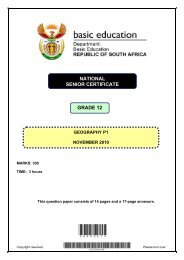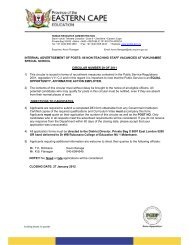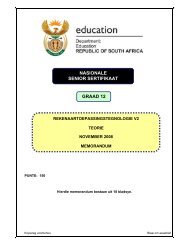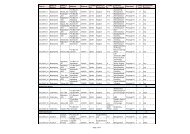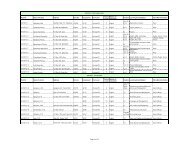Annual Performance Plan 2013/14 - Department of Education
Annual Performance Plan 2013/14 - Department of Education
Annual Performance Plan 2013/14 - Department of Education
Create successful ePaper yourself
Turn your PDF publications into a flip-book with our unique Google optimized e-Paper software.
<strong>Annual</strong> <strong>Performance</strong> <strong>Plan</strong> <strong>2013</strong>/<strong>14</strong><br />
108<br />
STRATEGIC GOAL 4<br />
GOAL STATEMENT Organizational capacity enhanced through human resource development and talent management<br />
in the accountability chain, with a general culture <strong>of</strong> blame-shifting. The accountability chain has to be strengthened from top to bottom. To begin with, parliamentary<br />
accountability is weak, with Parliament failing to fulfil its most basic oversight role. <strong>Education</strong> outcomes cannot improve unless accountability is reinforced throughout the<br />
system, from learner results to the delivery <strong>of</strong> text books.<br />
STRATEGIC GOAL 5<br />
GOAL STATEMENT Social cohesion promoted through cooperation with all stakeholders in education<br />
JUSTIFICATION <strong>Education</strong> is now seen as a societal matter and key in the transformation <strong>of</strong> society. It is undoubtedly the ladder to help people climb out <strong>of</strong> poverty, facilitate social<br />
cohesion through Life Orientation and the inculcation <strong>of</strong> human rights and empower them to become responsible citizens.<br />
LINKS This goal is linked to the MTSF Strategic Priority: Building cohesive, caring and sustainable communities.<br />
The President JG Zuma, In his State <strong>of</strong> the Nation Address on 3 June 2009 stated that: “<strong>Education</strong> will be a key priority for the next five years. We want our teachers,<br />
learners and parents to work together with government to turn our schools into thriving centres <strong>of</strong> excellence”. The President further stated: “We reiterate our nonnegotiables.<br />
Teachers should be in school and in class, on time, teaching, with no neglect <strong>of</strong> duty and no abuse <strong>of</strong> pupils! The children should be in class, on time,<br />
learning, be respectful <strong>of</strong> their teachers and each other, and do their homework”.<br />
These non-negotiables for Basic <strong>Education</strong> are the essence <strong>of</strong> the Quality Learning and Teaching Campaign, which the then Minister <strong>of</strong> <strong>Education</strong> launched on 11 August<br />
2008 with a Code <strong>of</strong> Conduct for key stakeholders and the slogan: “FORWARD TO QUALITY LEARNING AND TEACHING FOR ALL”, after the Ruling party had<br />
declared education a societal issue on 8 January 2008. A national Ten Point <strong>Plan</strong> was developed in November 2009 in this regard. The QLTC calls on all individuals<br />
and organisations to assume responsibility for improving the quality <strong>of</strong> education. The education elements <strong>of</strong> the campaign will:<br />
• inform citizens about the importance <strong>of</strong> education and their roles, responsibilities and obligations towards education;<br />
• mobilise communities to monitor and support schools, teachers and learners;<br />
• improve the quality <strong>of</strong> education for all children, especially the poor, and to demonstrate this improved quality via improved learner achievement.<br />
The achievement <strong>of</strong> quality education for all depends on the actions <strong>of</strong> members <strong>of</strong> Parliament, the Basic <strong>Education</strong> Ministry, provincial members <strong>of</strong> executive councils,<br />
departmental <strong>of</strong>ficials, school principals, teachers, learners, parents, school governors and members <strong>of</strong> the community.<br />
Each <strong>of</strong> these role-players are called upon to make a commitment to a “Code for Quality <strong>Education</strong>”, which describes the responsibilities and discipline required <strong>of</strong> them. If<br />
all sections <strong>of</strong> society work together – government, communities, health-care workers, civil society, business, the media and other sectors – we can ensure that all<br />
learners benefit from quality education. Campaign coordinating structures are being established at national, provincial, regional, local and school level and Government<br />
now calls on all South Africans to join in this campaign as part <strong>of</strong> an ongoing effort to achieve a better life for all.


